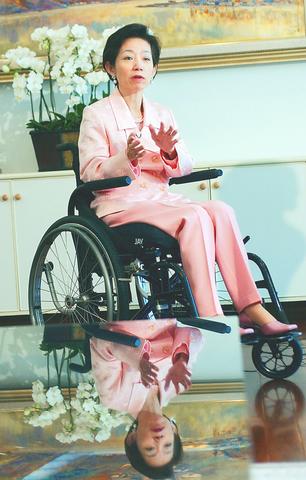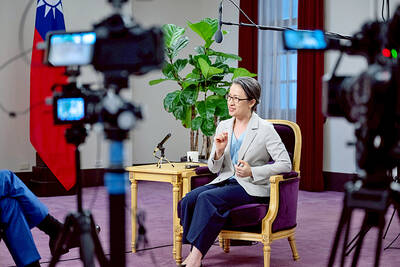Wu Shu-chen (吳淑珍) will be the ROC's second first lady to visit the US, but she stressed that comparisons between her and Madame Chiang (蔣夫人), Chiang Kai-shek's (蔣介石) wife, only touch the surface.
The previous first lady to visit Washington was Soong Mayling (
Later, while Chiang's KMT government battled communists in a civil war, the US-educated Madame Chiang -- fluent in English -- frequently went to Washington seeking support.

PHOTO: AP
Wu said that she and Madame Chiang, who is now 105 and lives in New York, are completely different people.
"I heard that her English was better than her Chinese," Wu, who speaks little English, said yesterday in the palm-tree-shaded presidential residence in southwest Taipei.
Another big difference, Wu said, was that Madame Chiang's husband was a dictator, while her husband is a democratically elected president.
She also recalled how Madame Chiang was often called a "first lady for life." Wu said she would never accept such a title.
"When my term as first lady is over, that's it," she said. "I'm going to be an ordinary person again."
Wu said yesterday that she has no plans to bring up the nation's sovereignty dispute with China during her upcoming historic trip to Washington -- unless someone asks her about it.
Wu will argue that Taiwan is definitely a sovereign nation if reporters in the US bring it up, she said in an exclusive interview.
"If we're not an independent nation, how could I be a first lady?" Wu said.
Wu, who leaves for the US on Thursday, will be the first president's wife to visit Washington in about half a century. The US capital has long been off-limits to Taiwanese leaders and other symbolic figures from Taiwan because of intense pressure from China.
But US President George W. Bush has adopted a friendlier policy toward Taiwan and Wu's visit is the latest example of Washington's new flexibility. Her nine-day trip includes stops in New York and Los Angeles.
Wu acknowledged that her visit might cause tensions between the US and China. But she said the American public would support her and her husband, President Chen Shui-bian (
"World leaders should have the freedom to visit other countries, and I think Americans will be able to agree with this," she said.
The first lady plans to give a speech at the National Arts Club in New York on Sept. 20. She will also speak at the American Enterprise Institute think tank in Washington on Sept. 24, and attend a cocktail reception in her honor at the US Congress on Sept. 25.
Wu said her speeches would focus on Taiwan's success in evolving from authoritarian rule to democracy.
She said that she saw no need to bring up Taiwan's claims that it isn't a part of the PRC. "I don't need to keep repeating this. It's just like I don't have to keep emphasizing that I'm a woman," she said.
Traveling abroad is difficult for the wheelchair-bound Wu, paralyzed from the waist down since a truck hit her in 1985 during Taiwan's repressive martial law era.
The driver, a farmer, said the incident was an accident and was never charged with a crime. But yesterday, Wu repeated her assertion that it was a politically motivated murder attempt, noting that the truck ran over her three times.
``The driver said he was just returning home, but that road absolutely wasn't the road to his home,'' she added.
Wu's face and voice showed no signs of anger during her matter-of-fact discussion of the event.

China might accelerate its strategic actions toward Taiwan, the South China Sea and across the first island chain, after the US officially entered a military conflict with Iran, as Beijing would perceive Washington as incapable of fighting a two-front war, a military expert said yesterday. The US’ ongoing conflict with Iran is not merely an act of retaliation or a “delaying tactic,” but a strategic military campaign aimed at dismantling Tehran’s nuclear capabilities and reshaping the regional order in the Middle East, said National Defense University distinguished adjunct lecturer Holmes Liao (廖宏祥), former McDonnell Douglas Aerospace representative in Taiwan. If

TO BE APPEALED: The environment ministry said coal reduction goals had to be reached within two months, which was against the principle of legitimate expectation The Taipei High Administrative Court on Thursday ruled in favor of the Taichung Environmental Protection Bureau in its administrative litigation against the Ministry of Environment for the rescission of a NT$18 million fine (US$609,570) imposed by the bureau on the Taichung Power Plant in 2019 for alleged excess coal power generation. The bureau in November 2019 revised what it said was a “slip of the pen” in the text of the operating permit granted to the plant — which is run by Taiwan Power Co (Taipower) — in October 2017. The permit originally read: “reduce coal use by 40 percent from Jan.

‘SPEY’ REACTION: Beijing said its Eastern Theater Command ‘organized troops to monitor and guard the entire process’ of a Taiwan Strait transit China sent 74 warplanes toward Taiwan between late Thursday and early yesterday, 61 of which crossed the median line in the Taiwan Strait. It was not clear why so many planes were scrambled, said the Ministry of National Defense, which tabulated the flights. The aircraft were sent in two separate tranches, the ministry said. The Ministry of Foreign Affairs on Thursday “confirmed and welcomed” a transit by the British Royal Navy’s HMS Spey, a River-class offshore patrol vessel, through the Taiwan Strait a day earlier. The ship’s transit “once again [reaffirmed the Strait’s] status as international waters,” the foreign ministry said. “Such transits by

Taiwan is doing everything it can to prevent a military conflict with China, including building up asymmetric defense capabilities and fortifying public resilience, Vice President Hsiao Bi-khim (蕭美琴) said in a recent interview. “Everything we are doing is to prevent a conflict from happening, whether it is 2027 or before that or beyond that,” Hsiao told American podcaster Shawn Ryan of the Shawn Ryan Show. She was referring to a timeline cited by several US military and intelligence officials, who said Chinese President Xi Jinping (習近平) had instructed the Chinese People’s Liberation Army to be ready to take military action against Taiwan